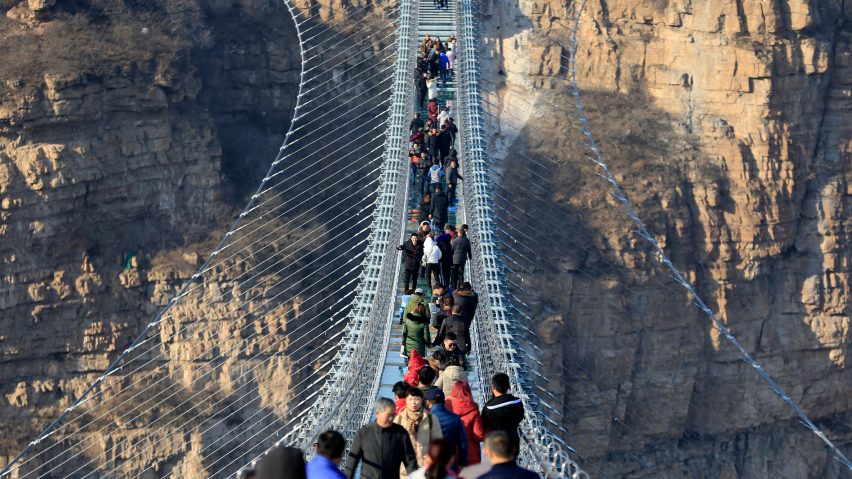A deliberate sway is designed to unnerve visitors to this 488-metre-long suspension bridge in China's Hebei province, which has an entirely glazed walkway so they can also admire the 218-metre drop.
The Hongyagu suspension bridge spans the gap between two cliffs in the Hongyagu Scenic Area.
Made of 1,077 panels of 4-centimetre-thick glass and supported by cables that weigh over 120 tonnes, the bridge is designed to take the weight of 2,000 people.
However, officials have decided to limit the number of tourists allowed on the attraction to just 600 at any one time.
Visitors must wear special booties over their shoes to protect the glass while crossing the bridge, which opened on 24 December 2017.
Guards are positioned at either end to help anyone who freezes in fear to get back across the bridge described as a "swaying sensation" by builders, the Hebei Bailu Group.
The structure has beaten the 430-metre-long Zhangjiajie Grand Canyon Glass Bridge to the claim of longest glass-bottomed suspension bridge in the world – although at 300 metres, the Zhangjiajie bridge is still the highest.
Designed by Tel Aviv architect Haim Dotan, the Zhangjiajie bridge had to close temporarily just two weeks after it opened after being overwhelmed by visitors. A reported 80,000 people attempted to visit it each day, despite it's maximum capacity of 800 pedestrians at one time and 8,000 daily visitors.
The Hongyagu's swaying span is not the first glass-bottomed bridge to bring the fear-factor to China's scenic parks.
In another part of Hebei, a 266-metre-long aerial path has special glass panels designed to look and sound as if they're splintering beneath the terrified feet of unwary travellers.
The highest bridge in the world is, the Beipanjiang Bridge, is also found in China – suspended 564 metres above the Beipan River.
But Switzerland hosts the longest pedestrian bridge, the mesh-bottomed Charles Kuonen Hängebrücke, or Europe's Bridge. At 494 metres long it hangs 84 metres over Switzerland's deepest valley, connecting the towns of Zermatt and Grächen.
Photography is by Getty Images/Visual China Group.

